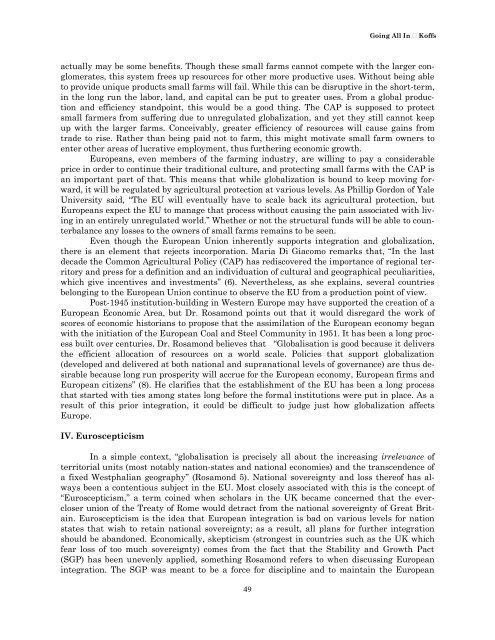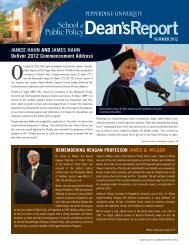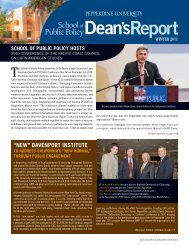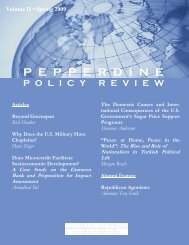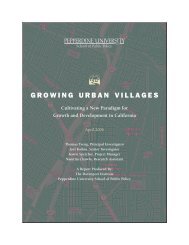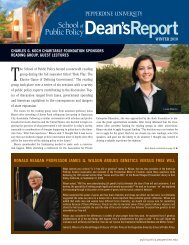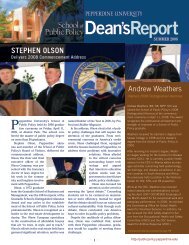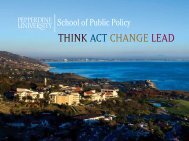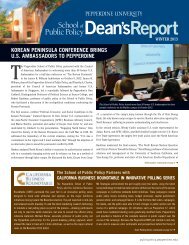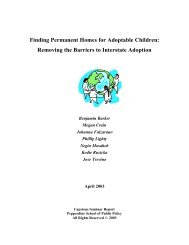Pepperdine University School of Public Policy
Pepperdine University School of Public Policy
Pepperdine University School of Public Policy
Create successful ePaper yourself
Turn your PDF publications into a flip-book with our unique Google optimized e-Paper software.
Going All In K<strong>of</strong>fs<br />
actually may be some benefits. Though these small farms cannot compete with the larger conglomerates,<br />
this system frees up resources for other more productive uses. Without being able<br />
to provide unique products small farms will fail. While this can be disruptive in the short-term,<br />
in the long run the labor, land, and capital can be put to greater uses. From a global production<br />
and efficiency standpoint, this would be a good thing. The CAP is supposed to protect<br />
small farmers from suffering due to unregulated globalization, and yet they still cannot keep<br />
up with the larger farms. Conceivably, greater efficiency <strong>of</strong> resources will cause gains from<br />
trade to rise. Rather than being paid not to farm, this might motivate small farm owners to<br />
enter other areas <strong>of</strong> lucrative employment, thus furthering economic growth.<br />
Europeans, even members <strong>of</strong> the farming industry, are willing to pay a considerable<br />
price in order to continue their traditional culture, and protecting small farms with the CAP is<br />
an important part <strong>of</strong> that. This means that while globalization is bound to keep moving forward,<br />
it will be regulated by agricultural protection at various levels. As Phillip Gordon <strong>of</strong> Yale<br />
<strong>University</strong> said, “The EU will eventually have to scale back its agricultural protection, but<br />
Europeans expect the EU to manage that process without causing the pain associated with living<br />
in an entirely unregulated world.” Whether or not the structural funds will be able to counterbalance<br />
any losses to the owners <strong>of</strong> small farms remains to be seen.<br />
Even though the European Union inherently supports integration and globalization,<br />
there is an element that rejects incorporation. Maria Di Giacomo remarks that, “In the last<br />
decade the Common Agricultural <strong>Policy</strong> (CAP) has rediscovered the importance <strong>of</strong> regional territory<br />
and press for a definition and an individuation <strong>of</strong> cultural and geographical peculiarities,<br />
which give incentives and investments” (6). Nevertheless, as she explains, several countries<br />
belonging to the European Union continue to observe the EU from a production point <strong>of</strong> view.<br />
Post-1945 institution-building in Western Europe may have supported the creation <strong>of</strong> a<br />
European Economic Area, but Dr. Rosamond points out that it would disregard the work <strong>of</strong><br />
scores <strong>of</strong> economic historians to propose that the assimilation <strong>of</strong> the European economy began<br />
with the initiation <strong>of</strong> the European Coal and Steel Community in 1951. It has been a long process<br />
built over centuries. Dr. Rosamond believes that “Globalisation is good because it delivers<br />
the efficient allocation <strong>of</strong> resources on a world scale. Policies that support globalization<br />
(developed and delivered at both national and supranational levels <strong>of</strong> governance) are thus desirable<br />
because long run prosperity will accrue for the European economy, European firms and<br />
European citizens” (8). He clarifies that the establishment <strong>of</strong> the EU has been a long process<br />
that started with ties among states long before the formal institutions were put in place. As a<br />
result <strong>of</strong> this prior integration, it could be difficult to judge just how globalization affects<br />
Europe.<br />
IV. Euroscepticism<br />
In a simple context, “globalisation is precisely all about the increasing irrelevance <strong>of</strong><br />
territorial units (most notably nation-states and national economies) and the transcendence <strong>of</strong><br />
a fixed Westphalian geography” (Rosamond 5). National sovereignty and loss there<strong>of</strong> has always<br />
been a contentious subject in the EU. Most closely associated with this is the concept <strong>of</strong><br />
“Euroscepticism,” a term coined when scholars in the UK became concerned that the evercloser<br />
union <strong>of</strong> the Treaty <strong>of</strong> Rome would detract from the national sovereignty <strong>of</strong> Great Britain.<br />
Euroscepticism is the idea that European integration is bad on various levels for nation<br />
states that wish to retain national sovereignty; as a result, all plans for further integration<br />
should be abandoned. Economically, skepticism (strongest in countries such as the UK which<br />
fear loss <strong>of</strong> too much sovereignty) comes from the fact that the Stability and Growth Pact<br />
(SGP) has been unevenly applied, something Rosamond refers to when discussing European<br />
integration. The SGP was meant to be a force for discipline and to maintain the European<br />
49


